

Obo-9780199730414-0099. Introduction Chartered companies were commercial organizations that enjoyed special privileges granted by the state, usually encapsulated in a royal charter.
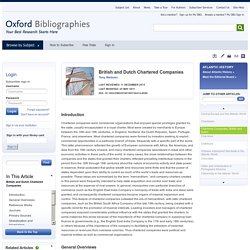
Www.britannica. Monopoly-history. Monopoly, or the exclusive control of a commodity, market or means of production, is an integral part of corporate and capitalist history.
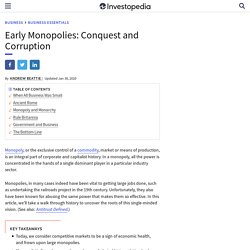
In a monopoly, all the power is concentrated in the hands of a single dominant player in a particular industry sector. Monopolies, in many cases indeed have been vital to getting large jobs done, such as undertaking the railroads project in the 19th century. Unfortunately, they also have been known for abusing the same power that makes them so effective. In this article, we'll take a walk through history to uncover the roots of this single-minded vision. (See also: Antitrust Defined.) Key Takeaways. Openlibrary. Dear Open Library Supporter, I ask only once a year: please help Open Library today.
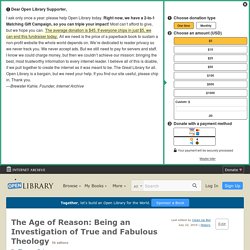
Right now, we have a 2-to-1 Matching Gift Campaign, so you can triple your impact! Most can’t afford to give, but we hope you can. The average donation is $45. If everyone reading this chips in just $5, we can end this fundraiser today. I ask only once a year: please help Open Library today. Www.cambridge. Plato.stanford. 1.
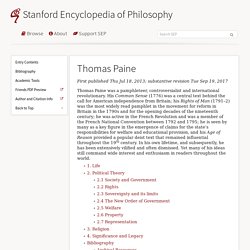
Abolitionism in the United States. Movement to end slavery in the United States Abolitionism (or the Anti-Slavery Movement) in the United States of America was the movement which sought to end slavery in the United States, active both before and during the American Civil War.
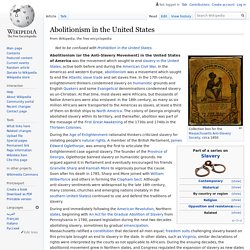
In the Americas and western Europe, abolitionism was a movement which sought to end the Atlantic slave trade and set slaves free. In the 17th century, enlightenment thinkers condemned slavery on humanistic grounds and English Quakers and some Evangelical denominations condemned slavery as un-Christian. The Age of Reason. Title page from the first English edition of Part I Several early copies of The Age of Reason The Age of Reason; Being an Investigation of True and Fabulous Theology is a work by English and American political activist Thomas Paine, arguing for the philosophical position of deism.
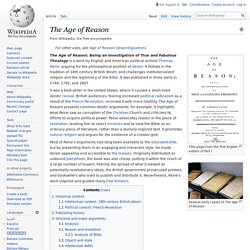
It follows in the tradition of 18th-century British deism, and challenges institutionalized religion and the legitimacy of the Bible. The Age of Reason - Thomas Paine. Thomas Paine. Paine lived in France for most of the 1790s, becoming deeply involved in the French Revolution.
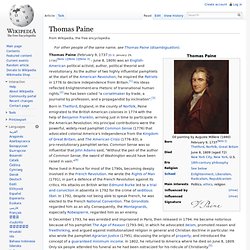
He wrote the Rights of Man (1791), in part a defence of the French Revolution against its critics. His attacks on British writer Edmund Burke led to a trial and conviction in absentia in 1792 for the crime of seditious libel. In 1792, despite not being able to speak French, he was elected to the French National Convention. The Girondists regarded him as an ally.
Radical. From Wikipedia, the free encyclopedia Jump to navigationJump to search Radical may refer to: Arts and entertainment[edit] Music[edit]
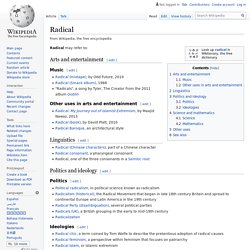
French Revolution. Revolution in France, 1789 to 1799 The causes of the French Revolution are complex and are still debated among historians.
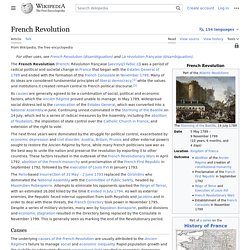
The American Revolution helped set the stage for the events of the French Revolution, having shown France that a rebellion based on Enlightenment principles, including natural rights and equality for all citizens, against an authoritarian regime could succeed. German diplomat Friedrich von Gentz (1764-1832) observed in a treatise published in France in 1800: Natural theology. Natural theology, once also termed physico-theology, is a type of theology that provides arguments for the existence of God based on reason and ordinary experience of nature.
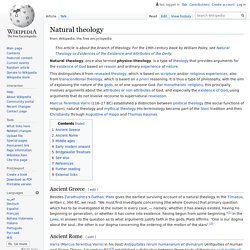
This distinguishes it from revealed theology, which is based on scripture and/or religious experiences, also from transcendental theology, which is based on a priori reasoning. It is thus a type of philosophy, with the aim of explaining the nature of the gods, or of one supreme God. For monotheistic religions, this principally involves arguments about the attributes or non-attributes of God, and especially the existence of God, using arguments that do not involve recourse to supernatural revelation.
Marcus Terentius Varro (116–27 BC) established a distinction between political theology (the social functions of religion), natural theology and mythical theology. His terminology became part of the Stoic tradition and then Christianity through Augustine of Hippo and Thomas Aquinas. Ancient Greece[edit] Ancient Rome[edit] Elite. Political cartoon from October 1884, showing wealthy plutocrats feasting at a table while a poor family begs beneath Mills states that the power elite members recognize other members' mutual exalted position in society.[2] "As a rule, 'they accept one another, understand one another, marry one another, tend to work, and to think, if not together at least alike'.
"[3][4] "It is a well-regulated existence where education plays a critical role. Freedom of thought. "Without freedom of thought there can be no such thing as wisdom & no such thing as publick liberty without freedom of speech", Benjamin Franklin, 1722. Overview[edit] Freedom of thought is the precursor and progenitor of—and thus is closely linked to—other liberties, including freedom of religion, freedom of speech, and freedom of expression.[1] Though freedom of thought is axiomatic for many other freedoms, they are in no way required for it to operate and exist. The conception of a freedom or a right does not guarantee its inclusion, legality, or protection via a philosophical caveat.
It is a very important concept in the Western world and nearly all[citation needed] democratic constitutions protect these freedoms. Toleration. Toleration is the allowing, permitting, or acceptance of an action, idea, object, or person which one dislikes or disagrees with. Random House Dictionary defines tolerance as "a fair, objective, and permissive attitude toward those whose opinions, beliefs, practices, racial or ethnic origins, etc., differ from one's own".[1] Toleration may signify "no more than forbearance and the permission given by the adherents of a dominant religion for other religions to exist, even though the latter are looked on with disapproval as inferior, mistaken, or harmful. "[2] Isaac Newton. Influential British physicist and mathematician Sir Isaac Newton PRS (25 December 1642 – 20 March 1726/27[a]) was an English mathematician, physicist, astronomer, theologian, and author (described in his own day as a "natural philosopher") who is widely recognised as one of the most influential scientists of all time, and a key figure in the scientific revolution.
His book Philosophiæ Naturalis Principia Mathematica (Mathematical Principles of Natural Philosophy), first published in 1687, laid the foundations of classical mechanics. Newton also made seminal contributions to optics, and shares credit with Gottfried Wilhelm Leibniz for developing the infinitesimal calculus. Life. Atheism. Deism. Deism ( DEE-iz-əm [1][2] or DAY-iz-əm; derived from Latin "deus" meaning "god") is the philosophical position that rejects revelation as a source of religious knowledge and asserts that reason and observation of the natural world are sufficient to establish the existence of a Supreme Being or creator of the universe.[3][4][5] At least as far back as Thomas Aquinas, Christian thought has recognized two sources of knowledge of God: revelation and "natural reason".
George Cruikshank. George Cruikshank (27 September 1792 – 1 February 1878) was a British caricaturist and book illustrator, praised as the "modern Hogarth" during his life. His book illustrations for his friend Charles Dickens, and many other authors, reached an international audience. French Revolution. Reign of Terror. Louis XVI of France. War of the First Coalition. 1790s war to contain Revolutionary France. Radical. Republicanism. Republicanism may also refer to the non-ideological scientific approach to politics and governance. William Godwin. Early life and education[edit] He then acted as a minister at Ware, Stowmarket and Beaconsfield. Enquiry Concerning Political Justice. Enquiry Concerning Political Justice and its Influence on Morals and Happiness is a 1793 book by the philosopher William Godwin, in which the author outlines his political philosophy. It is the first modern work to expound anarchism.
Background and publication[edit] English Dissenters. Richard Price. Edmund Burke. Reflections on the Revolution in France. Joseph Priestley. Priestley Riots. William Pitt the Younger. Seditious libel. Treason. 1794 Treason Trials. George III of the United Kingdom. Seditious Meetings Act 1795. Treason Act 1795. Freedom of assembly. Thomas Paine The Age of Reason. London Corresponding Society. Francis Place. Rights of Man. Seditious libel. Joel Barlow. Penny. Jacobin. Guillotine. James Monroe.
Daniel Isaac Eaton. Shilling. 1794 Treason Trials. Francis Place. Thomas Jefferson. Richard Carlile. Blasphemy law in the United Kingdom. William Sharp. George Romney. Institution. Millennialism. David Hume. Baruch Spinoza. Voltaire. Joseph Johnson. Tractatus Theologico-Politicus. Conyers Middleton. Deism. Peter Annet. John Toland. Matthew Tindal. Thomas Morgan. Thomas Woolston. Thomas Chubb. Eric Foner.
Vulgar. Elihu Palmer. Vulgar. Fall of man. Richard Watson. Seditious libel. Quakers. English Dissenters. Testimony of simplicity. E. P. Thompson. Virgin birth of Jesus. Conversion narrative. Millenarianism. Sacvan Bercovitch. Jeremiad. Puritans. Methodism. George Cruikshank. Ad hominem. English Dissenters. Joseph Priestley. Analytical Review. Constantin François de Chassebœuf, comte de Volney.